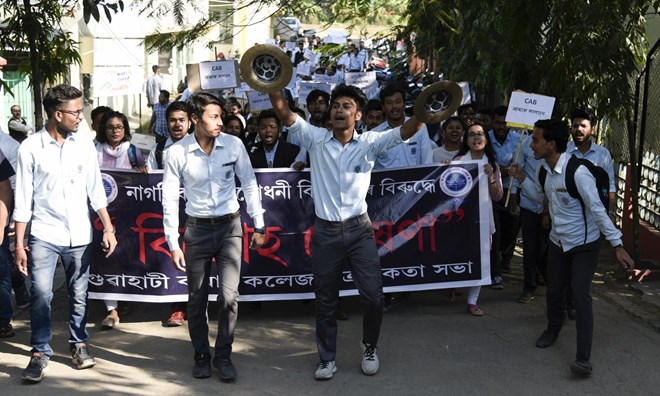
Tuesday December 10, 2019
Students protest against the citizenship amendment bill in Guwahati, India. The bill, which passed, was in line with ‘belief in humanitarian values’, said prime minister Narendra Modi. Photograph: David Talukdar/REX/Shutterstock
Lower house approves bill, drawing outcry amid claims prime minister Narendra Modi is seeking to sideline the faith
India’s lower house has passed controversial legislationthat will grant citizenship to religious minorities from neighbouring countries, but not Muslims, amid raucous scenes in parliament and protests in the country’s north-east.
The citizenship amendment bill provides that Hindus, Sikhs, Buddhists, Jains, Parsis, and Christians fleeing persecution in Muslim-majority Afghanistan, Bangladesh and Pakistan can be granted citizenship.
It comfortably passed the lower house with 311 votes in favour and 80 against just after midnight on Tuesday. The legislation seeks to amend the Citizenship Act of 1955, which prohibits illegal migrants from applying for Indian citizenship.
But to Muslim organisations, rights groups and others the bill is part of Modi’s push to marginalise India’s Islamic minority of 200 million people.
On Monday 100 scientists and scholars at institutions in India and abroad published a joint letter expressing their “dismay” at the legislation, saying the constitution called for members of all faiths to be treated equally. Modi’s “proposed bill would mark a radical break with this history and would be inconsistent with the basic structure of the constitution”.
The letter said such a careful exclusion of Muslims would “greatly strain” India’s pluralism.
Prominent political groups opposing the bill called for a complete shutdown across all the states in the north-east on Tuesday.
The home minister Amit Shah denied the claim of marginalisation, saying: “This is a bill to give rights, not to take them away from anybody.”
Modi’s government had tried to shepherd the legislation through parliament during its first term in power, but it failed in the upper house where Modi’s Bharatiya Janata party (BJP) and its allies lack a majority.
After sweeping to victory in the April-May national elections, the BJP is now more confident it can push the bill through both chambers.
During a lengthy debate marked by angry exchanges, the opposition Congress lawmaker Shashi Tharoor said the bill “infringes upon the principle of equality before law” guaranteed to all persons including non-citizens.
Under Modi several cities perceived to have Islamic-sounding names have been renamed, while some school textbooks have been altered to downplay Muslims’ contributions to India.
In August his administration rescinded the partial autonomy of Jammu and Kashmir, India’s only Muslim-majority state, and split it into two.
The government has defended the bill, saying it was aimed at flushing out infiltrators, and that Muslims did not face persecution in the three neighbouring countries.
“I say this again and again that this bill has nothing to do with the Muslims in this country. The Muslims in this country will be able to live here with dignity, are living here, and will continue to do so,” Shah said. “What are we doing now? We are giving the minority their rights.”
Shah has recently also proposed a “national register of citizens” that would see “each and every infiltrator identified and expelled” from India by 2024.
The citizenship bill has led to protests in India’s north-eastern states, where residents are unhappy about an influx of Hindus from neighbouring Bangladesh.
In Guwahati in Assam state protesters set fire to tyres while tribal groups staged protests in Tripura.